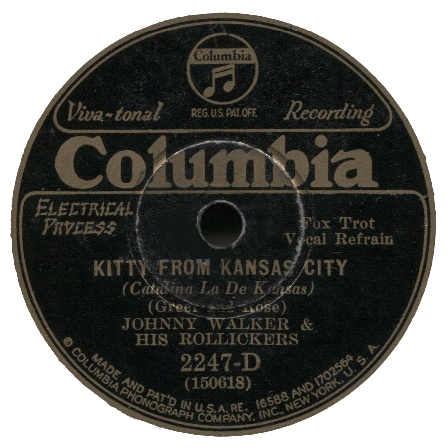
“Kitty From Kansas City”
Johnny Walker & His Rollickers; The Rondoliers, vocal
(Columbia 2247-D mx 150618) July 3, 1930
“Betty Co-ed”
Johnny Walker & His Rollickers; The Rondoliers, vocal
(Columbia 2247-D mx 150617) July 3, 1930
Here is a record from the Edward Mitchell collection featuring two novelty songs. Both were big hits for Rudy Vallee who also wrote the words to “Betty Co-ed.”
These recordings are by Ben Selvin’s in-house Columbia band issued under the pseudonym of Johnny Walker & His Rollickers. The vocals are provided by The Rondoliers, a male quartet that was well-known on radio during the early 1930s. Between 1930 and 1933 they recorded over 50 sides with Columbia, some as the featured artists and others, such as this, as vocal accompaniment to the label’s various dance bands.
In 1931 Fleischer Studios made both of the songs the subject of their own Talkartoons animated “follow the bouncing ball” musical short features. Each featured a cameo appearance of Rudy Vallee as well as the still-evolving cartoon character patterned after Helen Kane that emerged as Betty Boop. It is said that “Betty Co-Ed” was what inspired the Fleischers to name the character Betty.
Both cartoons, as of the date of this posting, can be viewed on YouTube and are entertaining. Betty Co-ed can be viewed at this link and Kitty From Kansas City at this link.
Over the years, I have had a number of people tell me that their first exposure to Jazz Age popular music was through reruns of 1930s cartoons they saw on television decades later as children. While the television broadcasts were mostly aimed at children, when the cartoons first appeared, they were shown to audiences of all ages ahead of the featured film in cinemas and included popular tunes of the day, albeit in novelty-type arrangements that matched the animation.
By the time such cartoons were being broadcast on television, the musical styles of the 1920s and 1930s had all but disappeared from the popular culture landscape and reruns of old cartoons and movies were one of the few sources that still provided a glimpse of it to sizeable audiences. Some of the songs from the era still endured, but the style in which they were performed was very different. Even the handful of bands from the era that managed to continue into the 1960s and 1970s had also changed to “keep up with the times.”
Most of the people who have told me about discovering the music through cartoon reruns mentioned that they did not realize that there had once been an entire wildly popular genre of such music in non-cartoon form until they were well into adulthood when the advent of the Internet finally made it easier for most people to access and discover.
